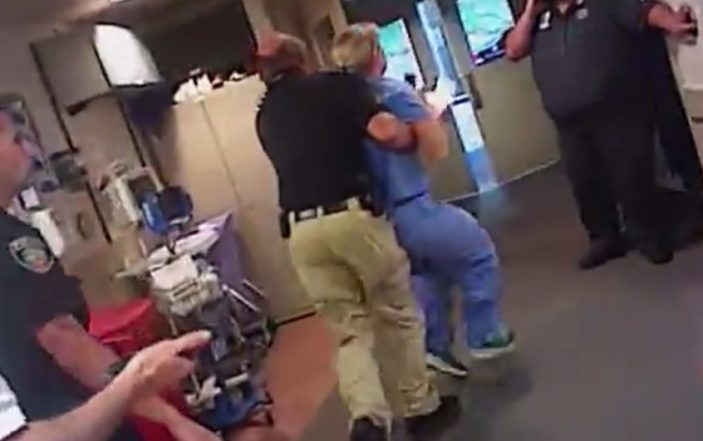We know about the occupational hazards of the emergency department. The agitated drunks, the mentally ill, the violent gang members. We’re trained to manage these situations, but we also take comfort that hospital security – and the police – have got our backs.
That comfort was really shaken last week when this body-cam video surfaced (or the full perspective from a fellow officer) of a police officer violently arresting a nurse in a Utah burn unit.
The police officer, Detective Jeff Payne, under the direction his Lieutenant, wanted to collect the blood of a patient that had been injured in a truck accident. As a part-time ambulance driver himself, Payne had a background in phlebotomy and wanted to draw the patient’s blood to check for illicit substances. He argued that he was trying to protect the truck-driving patient, who was not under arrest or suspected of any crime (the other driver in the crash, who had been fleeing police, died in the crash).
Nurse Alex Wubbels told the officer the patient was unconscious and couldn’t consent, while noting Payne didn’t have a warrant. Payne argued consent was implied, even as Wubbels and her supervisor explained hospital policy on blood draws that reportedly had been long ago agreed upon between the hospital and the department.
The body-cam video shows Wubbels re-iterating the rules (around the five minute mark). Payne seems to understand what’s being said, but speaking to the supervisor over the phone, he continues to blame the nurse for impeding the investigation. You can see Nurse Wubbels’ hands shaking as she holds the phone and paper form. The supervisor tells Payne he’s making a huge mistake by threatening a nurse.
Then Payne abruptly swings into action – he shouts, “We’re done here!” and approaches Wubbels, grabbing her, pushing her down the hall as she tries to back away, and cuffing her hands behind her back as she cries for help. Staffers surround Payne and try to talk him down, but he points fingers and says, “She’s under arrest.” He directs Wubbels to an unmarked car, as she screams “This is crazy!” and “I’ve done nothing wrong.”
Payne had been on active duty since the July 26 incident, though his blood-draw privileges were suspended. A police investigation was reportedly ongoing. However, after Wubbels’ attorneys released video of the incident on September 1, it quickly went viral. Salt Lake City police then put Payne on paid administrative leave after prosecutors called for a criminal investigation of the incident. Wubbels hasn’t pressed charges – yet – telling the Deseret News, “I want to see the people do the right thing first, and I want to see this be a civil discourse. If that’s not something that’s going to happen and there is refusal to acknowledge the need for growth and the need for re-education, then we will likely be forced to take that type of step.”
Implied consent laws in Utah were changed a decade ago, so that patients would not be subjected to invasive testing against their will. Additionally, in the 2016 case of Birchfield v. North Dakota, the US Supreme Court held that obtaining blood or breath samples was considered a “search” under the Fourth Amendment (which prohibits unreasonable searches and seizures). In determining whether a suspect could be compelled to submit to testing, the Court created a distinction between the two tests, noting that a breath test is not intrusive and is therefore permitted “incident to” an arrest, while blood testing was more invasive, involved “piercing the skin,” and therefore required a warrant or subject permission to avoid being deemed an “unlawful search” under the Fourth Amendment. In this case, the person from whom Detective Payne sought to have a blood sample taken was not even under arrest, making Payne’s (and his commanding officer’s) demands improper on their face. These actions would be similar to police stopping random people on the street and demanding that the people submit to blood testing.
Look for more information on the rights and responsibilities of physicians in cases like this in October’s edition of Emergency Physicians Monthly.




1 Comment
it could of been handled much differently. First it hard to believe a “veteran of 30 yrs in the system” didn’t know the law. Where was the ED physician in this? Next all of this could of been avoid by documenting the situation and allowing the police officer to do his job and then notifying the family, the hospital lawyer and police chief in the morning. Whatever they collected wouldn’t be legal and now it’s a clear civil right and assault and battery.